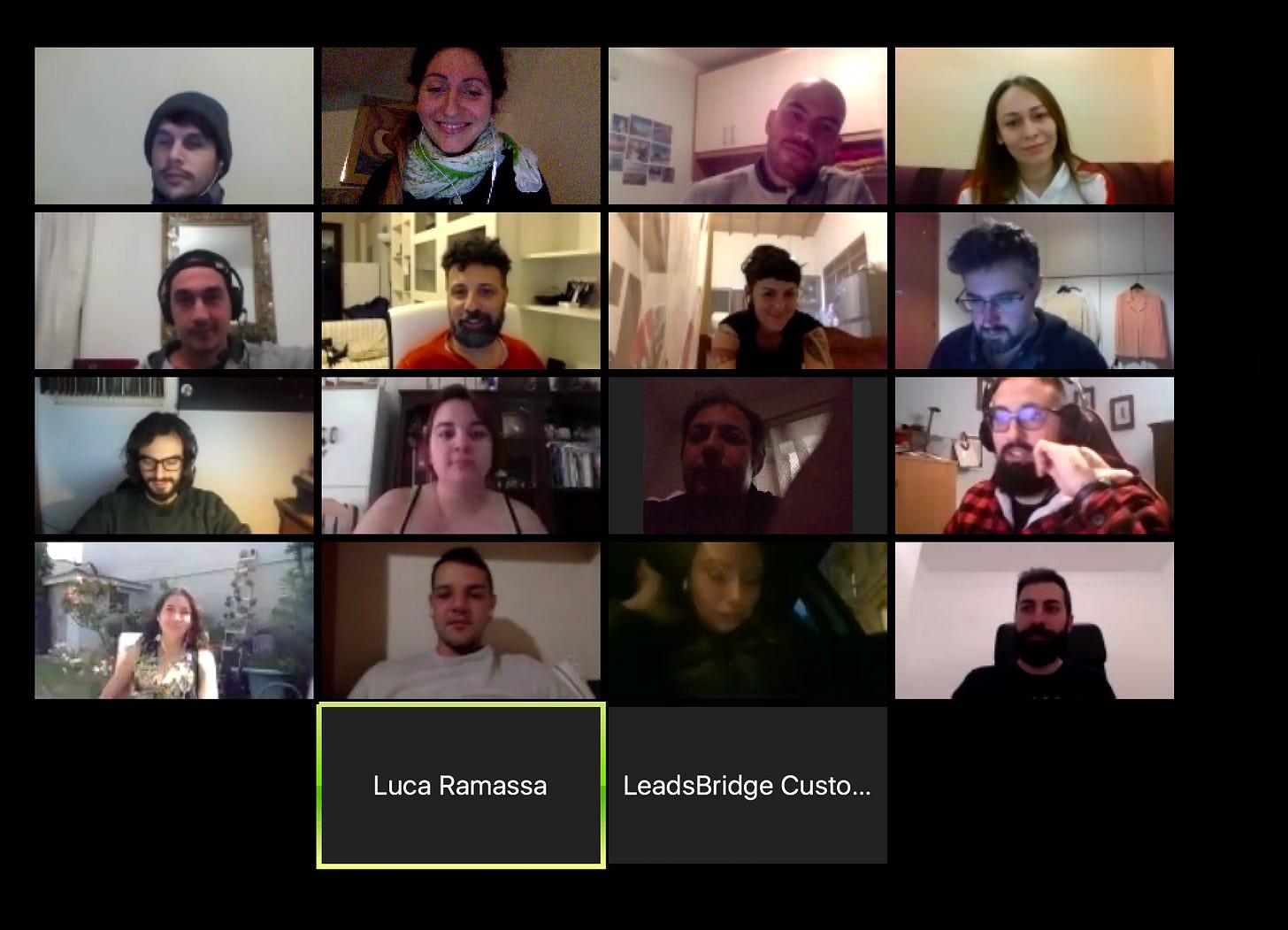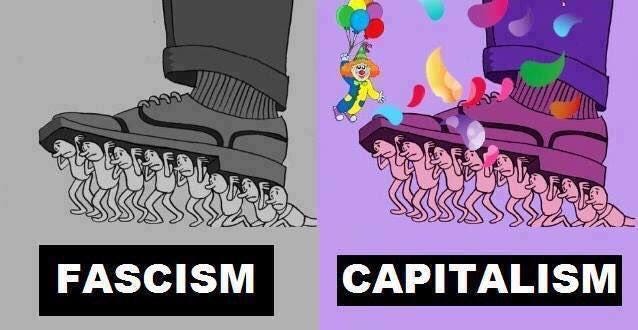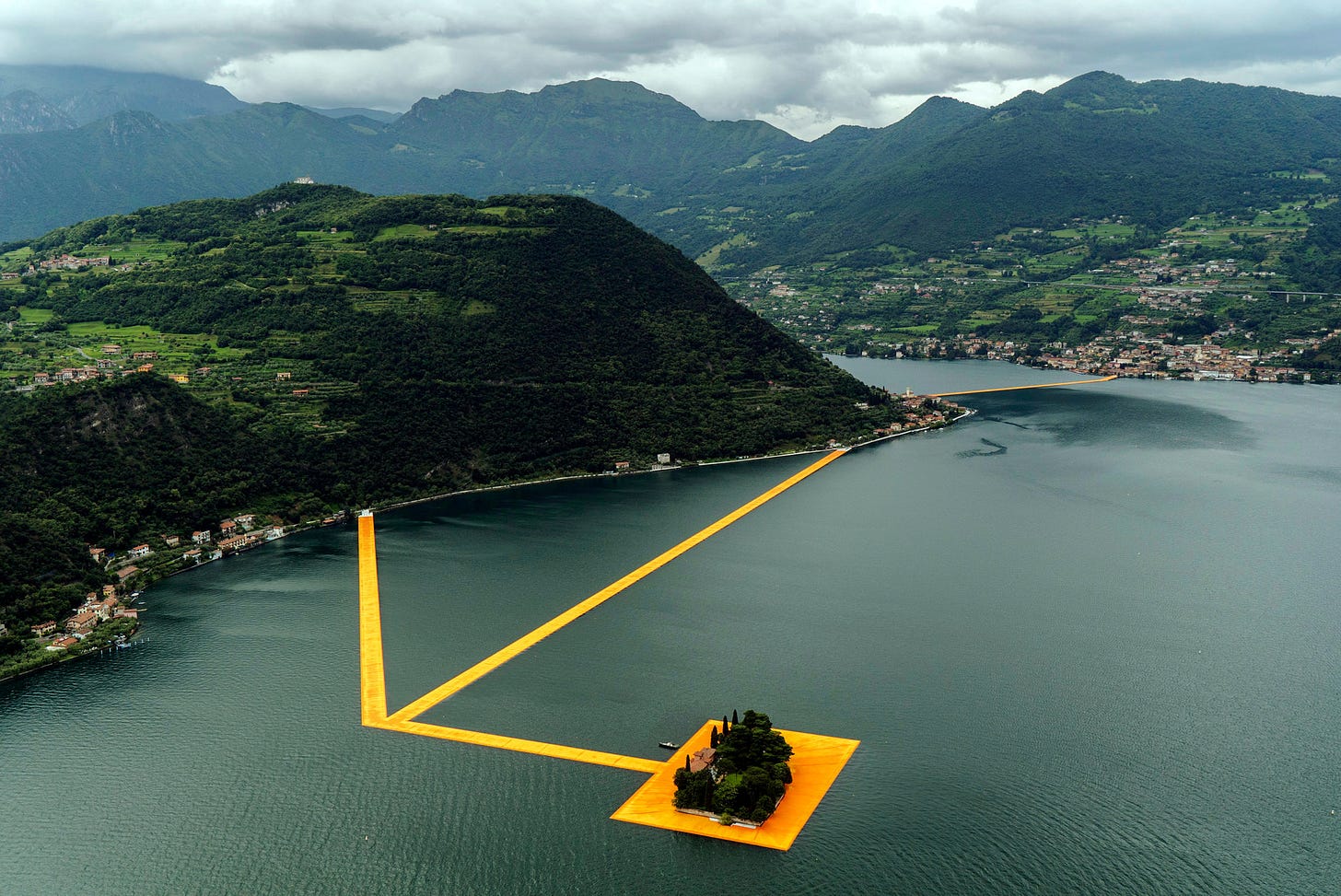Someone on a discord server I am on made an insightful criticism about the transition we’ve made as community organizers (full disclosure: I am far more often among the organized these days) from community meetings (what people my age used to call teach-in’s) to video conference calls or live-streams. We can’t safely cram fifty strangers into a church basement in the time of coronavirus, but we can get the same group to join a scheduled video conference.
I am not a popular person. I could be in a different Zoom call of this sort every night of the week if I wanted to be, but that’s not all. My zendo (Buddhist congregation) now meets online. My zen scripture study group now meets online. I am online in work conferences all day, I hang out with a group of friends by way of an impromptu Zoom conference while we all work on our projects, often peacefully just listening to the birds chirp near one participant’s computer mic. I know some popular people, I can only imagine what they must have on their Zoom plates.

I have wondered as I sit watching political organizing calls what in the world we are doing here? Everyone agrees with everyone else already. We’re all convinced. We’re all engaged enough to get in front of a computer at a particular date and time. What ends are served by this beautiful echo chamber?
Why did I show up?
I showed up because I am interested in what the people who believe the same things I do look and sound like. People who look like me generally don’t think like me. I have been segregated into the same social hierarchies that bother me so. People around me are well-meaning moderate liberals still convinced that capitalism can be made to work for humanity. That’s ok, they may be right, but I don’t agree.

People who do agree with me tend to be decades younger, not of European ethnicity, and tend to view people who look like me with suspicion…for good reason.
So, who are these people who see the world the way I do? Finding political community isn’t difficult for me. It takes time and mindful attention, but it’s there. Most often I find resonance with young Asian thinkers, particularly from Hong Kong and Taiwan. The people at my workplace with whom I find the most in common are decades younger and Asian.
I used to dismiss this as a kind of aspirational fandom. I do want to travel in Asia. I do want to learn Asian languages. I do favor Asian food, religions, and Art. But my resonance is with something far deeper than these personal preferences. There exists a mindful attention to the group, to what MLK called the beloved community, that suffuses the thinking and habits of the Asians I know which feels very tribal for me. I have a sense of belonging with people who care deeply, fundamentally, about the community they’re members of.
So, that’s it. I get on the call to be with my thought community. We tell each other what is important not to educate or persuade, but to affirm and validate. These people believe this. We all believe this, true, but it’s good to know one isn’t alone. These calls have a lot of value for this reason, and this is something very important.
But, it is not changing anything.
Change is going to come from a different kind of action. Many of those who believe what I do are in the streets now. I can’t be there with them. I can’t face the risk to myself, and I can’t face the risk I might pose to others.
This is frustrating me because I exist within a supportive system suffused with privilege. I enjoy the privileges of a modern workplace where a majority of the workforce is represented by a union. We are treated better than average employees because my employer is forced to provide privileges by a powerful union. This should not be the exception, it should be the rule.
That’s what needs to change. Shareholder lawsuits to prevent public corporations from acting in the interest of their employees should be banned. Capital owners need to step off. They should not be first in line for the spoils. The economy exists to serve people, not the other way around.
Citizens United, the court decision that enabled legal bribery of public officeholders, should be disabled by direct legislation. We need to put ourselves back in charge of our government. This change alone would go a long way to bringing things back to normal.
We need to make voting as easy as making an ATM transaction. We are able to securely process millions of ATM transactions daily with an acceptable level of error. Financial transactions are answers to questions tied to an identity, just like voting. As long as those in government can claim ignorance they can persist in inaction. We could change voting. We should.
I have much more specific concerns than these related to health care, incarceration, abusive corporate welfare, and the rights of the socially disenfranchised, but I recognize we won’t make any of these changes without making it possible to vote, disabling the ability of shareholders to punish corporations by any other method than divestiture, and outlawing influencing officeholders with money. These must happen first.
I also recognize that on these more specific issues like health care, incarceration, et al. I represent a polemic extreme. I could be wrong. Reasonable people can disagree on the role that incarceration has in civil society, but I think everyone agrees we should be able to vote, people who run companies should be able to care for the employees without being sued, and politicians should keep their jobs based on their ideas, not the size of the bribes they can legally solicit (aka fundraising).
We must level the playing field. Elizabeth Warren was the primary candidate most focused on these issues. She talked directly about them, daily. Senator Warren and I disagree about a lot of policy, reams of it, but I supported her because she was focusing directly, technocratically, on change.
But, she’s never hugged me, we’ve never met and likely never will. I’ve got my Zoom calls for that. This is how they fit in. They connect and validate.
Change will come in the streets.
Does that mean we should be there now? Wow, there is really no simple answer to this because of CoVID-19. We know how to revive a dead political movement, we do not know how to revive dead people. That’s the bottom line for me. We may need to put all social movement on hold until it is acceptably safe to be social with strangers again. We need to be patient until there is an effective treatment or vaccine.
I have studied much about the tactics and biography of Martin Luther King Jr. I’ll confess I feel as though I know him a little, I’m not sure we would have been friends, he was a bit too much of a misogynist in his personal life for my tastes, but I’m certain we would have mutually recognized our alliance in pursuit of justice.
I am willing to bet my rent money that Dr. King would be urging people to take action in safer ways. Instead of spending energy screwing up courage to brave the exposure of a mass street protest, maybe something could be done along the lines of the works of the recently diseased Christo (full disclosure, I worked on The Gates in Central Park fifteen years ago). Perhaps this is already happening…

If you have been living under a rock, this is 16th in DC, the street which leads to The White House, 1600 Pennsylvania Avenue. In a world where people actually voted for a repeatedly bankrupt second-rate condo salesman because he was the talent on a slickly network produced game show, I don’t think it is unreasonable to surmise that this might well be a more powerful agent of change than seeing these same streets darkened by protestors.
I suspect Dr. King would have strongly favored this kind of protest at this time, and so do I. Street protest marches have their place, we will always need them, but we can’t let ourselves be forced into unwise actions by a simple dearth of imagination. My mention of Christo above was not casual. Imagine seeing police headquarters like this:

Imagine Rikers Island looking like this:

I don’t mean to suggest we should only protest via architectural-scale visuals, but we should leverage our imaginations to more effective protocols for change. Street protest is one, we should not relinquish it, but we need more.
Zoom calls are one place we can workshop ideas and organize proof of concepts. We need national strikes in the form of days of prayer and reflection, not as belligerent “eat the rich” displays. We can all stand outside and bang on pots and pans at 7pm every day, that has changed people’s minds about who really protects us.
Similar actions can move people to vote to level the playing field in this country, to bring justice to the unpopular and disenfranchised, and to prevent known criminals from gaining public office in the future.
The revolution will not be live-streamed.

